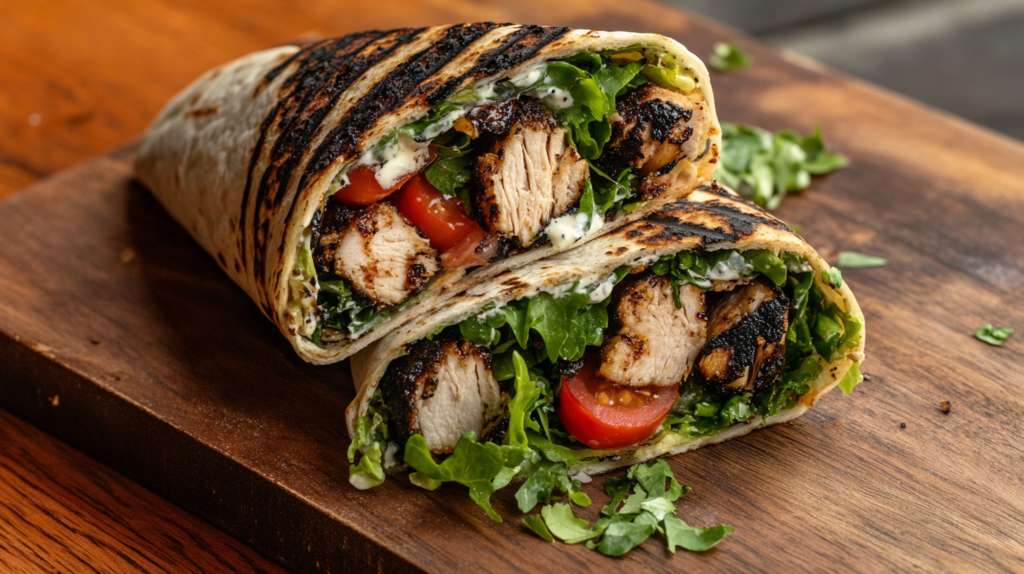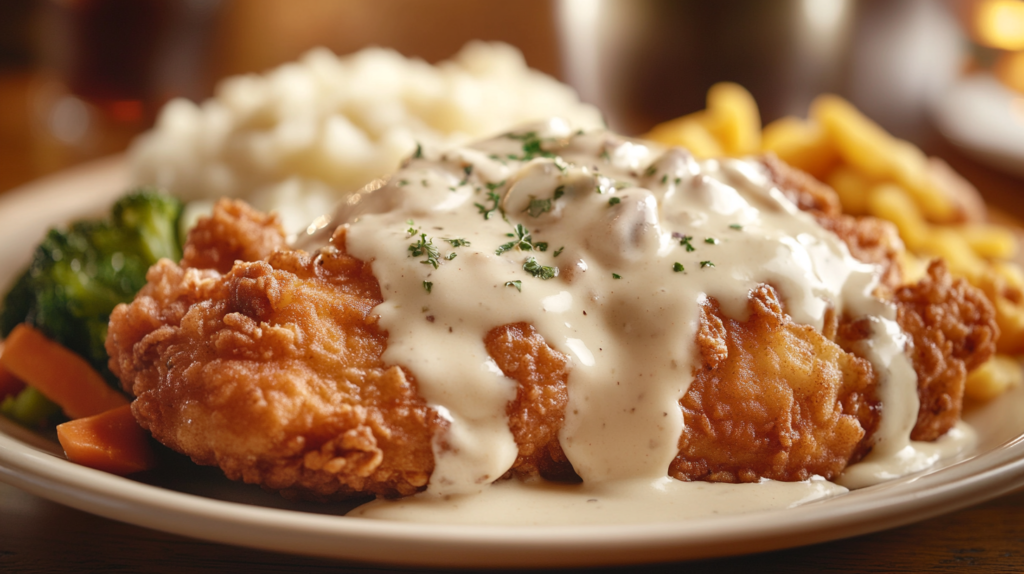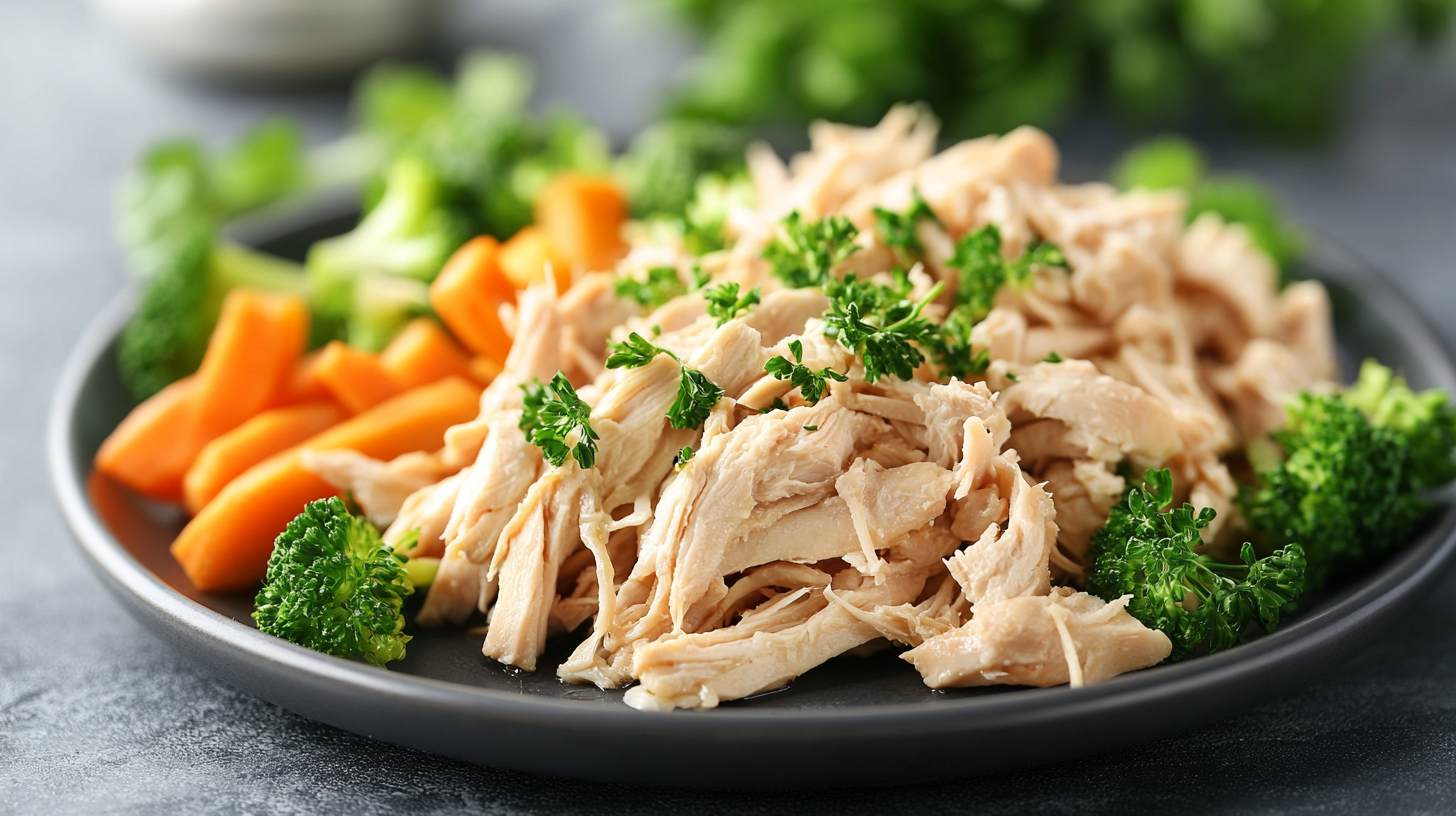Bariatric surgery is life-changing, and adjusting to a new way of eating can be challenging. If you’re looking for high-protein, low-carb, and easy-to-digest meals, chicken is your best friend! This guide features 15 delicious bariatric chicken recipes that are perfect for anyone following a post-surgery diet.
Table of Contents
Why Chicken is a Perfect Protein for Bariatric Diets
After bariatric surgery, your stomach size is significantly reduced, making it essential to eat nutrient-dense foods that provide maximum benefits in small portions. Chicken is a top choice because:
- It’s lean and high in protein, aiding in muscle maintenance and weight loss.
- It’s low in fat, preventing unnecessary calorie intake.
- It’s versatile and easy to digest, making it ideal for different stages of post-surgery eating.
Nutritional Benefits of Chicken for Post-Surgery Patients
Chicken is a nutritional powerhouse for bariatric patients. A 3-ounce serving of skinless, boneless chicken breast contains:
- 26 grams of protein – essential for muscle repair and satiety.
- 3 grams of fat – keeping the meal light and digestion-friendly.
- 0 grams of carbs – making it a perfect low-carb option.
Choosing grilled, baked, or slow-cooked chicken over fried options ensures you get maximum benefits without unnecessary calories.
How to Prepare Chicken for Easier Digestion
Post-bariatric surgery, you must be mindful of how your food is cooked and eaten. Here are some tips to make chicken easier on your stomach:
✅ Slow cook or bake to keep it soft and tender.
✅ Shred or finely chop for easier chewing and digestion.
✅ Pair with soft vegetables like zucchini or carrots for added nutrients.
✅ Use broths or light sauces to keep it moist and easy to swallow.
For more ways to prepare chicken that’s easy on digestion, check out these low-sodium chicken recipes.
Essential Cooking Tips for Bariatric-Friendly Chicken Meals
Portion Control: Eating the Right Amount After Surgery
After surgery, eating too much too quickly can cause discomfort. A good rule of thumb is to:
- Start with 2-3 ounces of chicken per meal.
- Eat slowly and chew thoroughly to prevent stomach issues.
- Listen to your body’s signals – stop eating when full.
Cooking Methods: Best Ways to Keep Chicken Tender
Not all cooking methods work well for bariatric diets. Here’s what works best:
- Slow cooking – keeps the meat tender and easy to digest.
- Baking – locks in moisture without adding unhealthy fats.
- Poaching – gently cooks chicken, making it soft.
- Grilling – if done properly, can keep the chicken juicy and flavorful.
Looking for a delicious grilled chicken wrap? Try this grilled chicken wrap recipe for a healthy, high-protein meal!
15 Delicious Bariatric Chicken Recipes to Try
Each of these recipes is designed for post-bariatric surgery diets, focusing on high protein, low carbs, and easy digestion.
1. Soft and Juicy Baked Lemon Herb Chicken

A simple yet flavorful dish, perfect for soft food stages.
Ingredients:
- 2 boneless, skinless chicken breasts
- 1 tablespoon olive oil
- 1 teaspoon garlic powder
- ½ teaspoon salt
- ½ teaspoon black pepper
- 1 teaspoon dried oregano
- Juice of 1 lemon
Instructions:
- Preheat oven to 375°F.
- Rub chicken with olive oil and season with spices.
- Place in a baking dish and drizzle with lemon juice.
- Bake for 25-30 minutes or until fully cooked.
Tip: Serve with steamed zucchini for added fiber.
2. Slow Cooker Shredded Chicken for Easy Meals
Perfect for meal prepping or adding to soups and salads.
Ingredients:
- 2 large chicken breasts
- ½ cup low-sodium chicken broth
- 1 teaspoon onion powder
- 1 teaspoon garlic powder
- ½ teaspoon paprika
Instructions:
- Place all ingredients in a slow cooker.
- Cook on low for 4-6 hours.
- Shred with a fork and store for easy meals.
For more slow-cooked chicken ideas, check out this chicken chop recipe.
3. High-Protein Chicken and Veggie Soup

Light and easy to digest, this soup is perfect for post-surgery meals.
Ingredients:
- 2 cups shredded cooked chicken
- 1 carrot, diced
- 1 zucchini, diced
- 4 cups low-sodium chicken broth
- ½ teaspoon dried thyme
Instructions:
- Bring broth to a simmer and add veggies.
- Cook until tender, then add shredded chicken.
- Simmer for 10 more minutes and serve warm.
4. Low-Carb Grilled Chicken Wraps

A protein-packed, bariatric-friendly alternative to heavy wraps.
Try this grilled chicken wrap recipe for a satisfying meal.
5. Cheesy Chicken Cauliflower Casserole
A comforting, low-carb alternative to pasta-based dishes.
Ingredients:
- 2 cups cooked shredded chicken
- 1 cup steamed cauliflower, mashed
- ½ cup cottage cheese
- ½ cup shredded mozzarella
- ½ teaspoon garlic powder
Instructions:
- Mix ingredients in a bowl and transfer to a baking dish.
- Bake at 375°F for 20 minutes or until cheese is melted.
For more low-carb chicken recipes, check out these carnivore diet chicken recipes.
6. Protein-Packed Chicken Egg Muffins
Great for a quick and easy bariatric breakfast.
Try these chicken breakfast recipes for more high-protein breakfast ideas.
7. Instant Pot Garlic Parmesan Chicken
A quick and easy meal using an Instant Pot.
Ingredients:
- 2 boneless, skinless chicken breasts
- ½ cup chicken broth
- 1 teaspoon garlic powder
- ½ teaspoon salt
- ¼ cup grated Parmesan cheese
Instructions:
- Place all ingredients in the Instant Pot.
- Cook on high pressure for 10 minutes.
- Release pressure and serve.
8. Simple Greek Yogurt Chicken Salad
A high-protein alternative to traditional chicken salad.
Try this Hellmann’s chicken salad recipe for more variations.
9. Air Fryer Crispy Chicken Tenders (Without Breading)
A crispy yet healthy option for post-bariatric meals.
Try this hot honey chicken tenders recipe for a delicious twist.
10. Zesty Buffalo Chicken Lettuce Wraps
A spicy yet light meal that fits perfectly in a bariatric diet.
Try this Buffalo chicken flatbread recipe for more spicy chicken meal ideas.
11. Easy One-Pan Chicken and Zucchini Skillet
A quick, low-carb dinner option that’s full of flavor.
12. Healthy Chicken Meatballs with Marinara
A great alternative to traditional meatballs, using ground chicken.
Try these ground chicken pasta recipes for more meal ideas.
13. Savory Turmeric Chicken Soup
A warm, anti-inflammatory soup that’s easy to digest.
14. Low-Carb Creamy Chicken Alfredo
A rich and satisfying meal without the heavy pasta.
Try this Bertolli chicken Alfredo recipe for a creamy and comforting dish.
15. Quick and Flavorful Chicken Stir-Fry
A simple and delicious one-pan meal.
For more chicken and rice ideas, check out these Knorr chicken and rice recipes.
Common Mistakes to Avoid When Cooking Bariatric Chicken Recipes
While chicken is a great protein choice for post-bariatric surgery, there are some common mistakes that can make it less enjoyable or harder to digest. Here’s what to watch out for:
Overcooking Chicken and Making it Dry
Overcooked chicken becomes tough, dry, and difficult to chew, which can be a problem for bariatric patients. To prevent this:
- Use low and slow cooking methods like baking, poaching, or slow cooking.
- Check the internal temperature with a meat thermometer – chicken is done at 165°F.
- Avoid high-heat grilling without proper marination, as it can dry out the meat.
Looking for a juicy, flavorful grilled chicken recipe? Try this chicken chop recipe for tips on keeping grilled chicken tender.
Using High-Fat Ingredients That Slow Weight Loss

While fat is essential, too much unhealthy fat can slow down weight loss after surgery. Avoid:
- Heavy creams and full-fat cheeses – use Greek yogurt or cottage cheese instead.
- Fried chicken – opt for baked, air-fried, or grilled options.
- Store-bought marinades – many contain hidden sugars and unhealthy fats.
For a low-fat but creamy alternative, try this chicken cottage cheese recipe.
Ignoring Portion Sizes and Nutritional Balance
Even with healthy ingredients, eating too much at once can cause discomfort. To avoid this:
- Measure protein portions carefully (2-3 ounces per meal).
- Pair chicken with fiber-rich vegetables for better digestion.
- Avoid overeating sauces or dressings that add unnecessary calories.
For a light but satisfying chicken dish, try this chicken pastry recipe.
How to Store and Meal Prep Bariatric Chicken Dishes
Meal prepping makes it easier to stick to a bariatric-friendly diet while saving time in the kitchen. Here’s how to do it right.
Proper Freezing and Reheating Methods
Not all chicken dishes freeze well, but here’s how to keep them fresh:
✅ Shred or slice chicken before freezing for easier portion control.
✅ Store in airtight containers to prevent freezer burn.
✅ Reheat gently on the stove or in a microwave with added broth to keep it moist.
Looking for a meal-prep-friendly chicken dish? This chicken rice a roni recipe is a great option for make-ahead meals.
Best Storage Containers for Freshness
Choosing the right containers helps maintain texture and flavor:
- Use glass meal prep containers to keep food fresh longer.
- Store portions in individual servings for easy grab-and-go meals.
- Label each container with dates to track freshness.
For more meal prep-friendly chicken recipes, try this buffalo chicken dip recipe – perfect for portioning into small servings.
Creative Ways to Enjoy Bariatric Chicken Meals
If you’re eating chicken often, it’s easy to get bored with the same flavors. Here are some exciting ways to add variety while keeping meals healthy and easy to digest.
1. Use Chicken in High-Protein Breakfasts
Start your day with a protein boost by adding chicken to your breakfast. Try:
- Chicken and egg muffins – These are easy to make and perfect for meal prepping. Check out these chicken breakfast recipes for more ideas.
- Shredded chicken omelet – A simple way to add lean protein to your morning routine.
- Greek yogurt chicken salad wrap – Use a low-carb tortilla or a lettuce wrap for a bariatric-friendly option.
2. Make Protein-Packed Chicken Snacks
Bariatric patients often need small, protein-rich meals throughout the day. Here are some chicken-based snack ideas:
- Buffalo chicken dip – Perfect for pairing with cucumber slices or whole-grain crackers. Try this Buffalo chicken dip recipe for a spicy kick.
- Chicken cottage cheese bowl – Mix shredded chicken with low-fat cottage cheese and seasonings for a high-protein snack.
- Chicken and avocado lettuce cups – A fresh and light option that’s easy to digest.
3. Turn Leftover Chicken into New Meals
Meal prepping often leaves you with extra cooked chicken. Instead of eating the same dish multiple times, transform your leftovers into new and exciting meals:
- Chicken and rice skillet – Use a low-carb rice alternative like cauliflower rice. Try this Knorr chicken and rice recipe for more inspiration.
- Stuffed zucchini boats – Mix shredded chicken with light marinara sauce and stuff it into zucchini halves, then bake.
- Healthy chicken tacos – Use a low-carb tortilla or lettuce wrap with shredded chicken, Greek yogurt, and fresh salsa.
4. Try Different Seasonings Without Adding Extra Calories
To keep meals exciting, switch up the seasoning and sauces while keeping them low in fat and sugar.
- Lemon garlic & herbs – A fresh, zesty combination.
- Buffalo-style – Use Franks Red Hot Sauce for a spicy twist. Pair it with this Buffalo chicken flatbread recipe.
- Mediterranean flavors – Use oregano, garlic, and a touch of lemon juice.
- Asian-inspired – Mix ginger, garlic, and a dash of low-sodium soy sauce for a light stir-fry.
For more seasoning and cooking ideas, check out these low-sodium chicken recipes.
More Meal Prep Tips for Bariatric Chicken Dishes
Meal prepping is a game-changer for bariatric patients. Here’s how to save time and stay on track with your diet.
Batch Cooking for the Week
Instead of cooking every single day, prepare a large batch of shredded or grilled chicken at the beginning of the week.
- Cook several chicken breasts in a slow cooker or Instant Pot.
- Shred or dice them and store in individual meal containers.
- Use different seasonings each day to create variety without extra work.
Portioning Chicken for Easy Grab-and-Go Meals
After bariatric surgery, portion control is key. Here’s how to prep meals without overeating:
✅ Weigh portions using a kitchen scale – stick to 2-3 ounces per meal.
✅ Use small containers to prevent over-serving.
✅ Store diced chicken in freezer-safe bags for easy access.
For a quick and easy meal, try this grilled chicken wrap recipe using your prepped chicken.
Best Containers for Storing Prepped Chicken
The right containers keep your meals fresh and easy to reheat:
- Glass meal prep containers – Keep food fresh longer.
- BPA-free plastic containers – Great for freezer storage.
- Silicone freezer bags – Save space while keeping meals sealed.
If you love chicken-based meal prep dishes, try this chicken rice a roni recipe for a convenient meal option.
Final Thoughts on Bariatric Chicken Recipes
Adjusting to a bariatric-friendly diet doesn’t mean giving up delicious meals. With lean protein, the right cooking methods, and proper portion control, chicken can be a versatile and satisfying part of your post-surgery lifestyle.
Here’s a quick recap of what we covered:
- Chicken is an excellent protein choice for bariatric patients due to its high protein and low-fat content.
- Cooking techniques matter – baking, slow cooking, and grilling keep chicken moist and easy to digest.
- Portion control is key – aim for 2-3 ounces per meal to prevent discomfort.
- Meal prepping helps you stay on track – store chicken properly and use easy-to-reheat methods.
- Avoid common mistakes like overcooking, adding too much fat, or ignoring portion sizes.
By incorporating these 15 bariatric chicken recipes, you can enjoy nutritious, high-protein meals without feeling deprived.
For more delicious chicken recipes, check out:
Eating well after bariatric surgery doesn’t have to be boring. With the right recipes and meal prep strategies, you can stay on track with your health goals while enjoying flavorful, satisfying meals.
Frequently Asked Questions (FAQs)
1. What kind of chicken is best for bariatric recipes?
Skinless, boneless chicken breast is the best choice because it’s high in protein and low in fat. However, chicken thighs can also be used in moderation, especially in slow-cooked dishes to keep them tender and juicy.
2. How much chicken should I eat after bariatric surgery?
Portion sizes vary based on your post-surgery stage, but a general guideline is:
- Soft food stage: 1-2 ounces per meal
- Regular diet stage: 2-3 ounces per meal
Always listen to your body and consult your dietitian or doctor for personalized advice.
3. What is the easiest way to cook chicken for bariatric meals?
The best cooking methods to keep chicken moist and easy to digest are:
✅ Slow cooking – Keeps it tender and flavorful.
✅ Baking – Helps lock in moisture without added fat.
✅ Poaching – Cooks chicken gently, making it easy to shred.
Avoid frying or using excessive oil, as these methods can add unnecessary calories.
4. How do I prevent chicken from becoming dry and tough?
To keep chicken tender:
- Don’t overcook – Use a meat thermometer and cook to 165°F.
- Marinate chicken in Greek yogurt or a light vinaigrette for extra moisture.
- Shred or dice chicken before eating for easier digestion.
For juicy chicken recipes, try this grilled chicken wrap recipe.
5. Can I eat chicken every day on a bariatric diet?
Yes! Chicken is a great source of lean protein, which is essential for post-surgery recovery and maintaining muscle mass. However, it’s best to add variety with other protein sources like fish, eggs, and plant-based proteins.
6. Are there any low-carb sauces I can use with chicken?
Yes! Some bariatric-friendly sauce options include:
- Greek yogurt-based sauces (like tzatziki)
- Low-sodium marinara sauce
- Sugar-free BBQ sauce
- Lemon garlic butter (with minimal butter)
For a creamy yet low-fat dish, try this chicken cottage cheese recipe.
7. Can I freeze cooked bariatric chicken meals?
Absolutely! Here’s how to freeze them properly:
- Shred or slice chicken before freezing for easier portioning.
- Store in airtight containers or freezer bags.
- Label with the date and consume within 3 months for the best taste.
For a freezer-friendly recipe, try this chicken rice a roni recipe.
8. Can bariatric patients eat chicken?
Yes, bariatric patients can eat chicken, but it’s important to prepare it in a way that makes it easy to chew and digest. Chicken is an excellent source of lean protein, which is essential for healing and maintaining muscle mass after surgery. The best options are:
- Soft, moist preparations like shredded or slow-cooked chicken.
- Avoiding dry or tough textures by cooking at low temperatures.
- Eating small portions (2-3 ounces per meal) to prevent discomfort.
For a great post-surgery option, try this soft and juicy chicken recipe.
9. What is the healthiest way to cook chicken for weight loss?
The healthiest ways to cook chicken for weight loss are low-fat and high-protein cooking methods:
✅ Grilling – Adds flavor without extra calories.
✅ Baking – Keeps chicken tender with minimal oil.
✅ Poaching – Cook chicken in broth or water for a soft, juicy texture.
✅ Slow cooking – Retains moisture and enhances tenderness.
Avoid deep frying or using heavy sauces that add unnecessary calories. Instead, try this grilled chicken wrap recipe for a healthy meal.
10. How to cook chicken for gastric patients?
For gastric patients, easy digestion is key. Follow these cooking tips:
- Use moist cooking methods (slow-cooked, poached, or baked).
- Shred or finely dice chicken to make it easier to eat.
- Pair with soft, fiber-rich vegetables for balance.
- Avoid tough, dry, or spicy preparations that may cause discomfort.
A gentle, high-protein meal like this low-sodium chicken recipe is ideal for gastric patients.
11. Can I eat chicken salad after bariatric surgery?
Yes, chicken salad is a great option after bariatric surgery, but it should be prepared in a way that is:
✅ Low-fat – Use Greek yogurt instead of mayonnaise.
✅ Easy to digest – Shred the chicken finely.
✅ Well-portioned – Stick to 2-3 ounces per serving.
For a bariatric-friendly version, try this Hellmann’s chicken salad recipe with a healthier twist.

